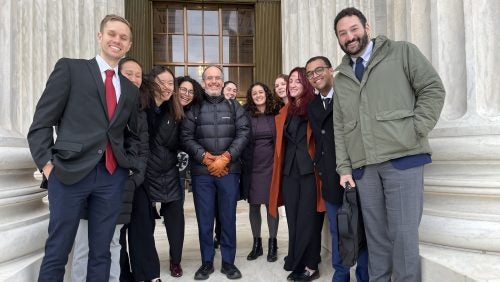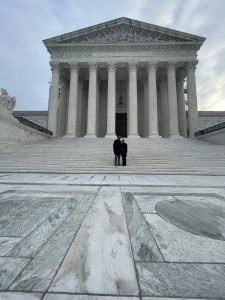Georgetown Law Appellate Immersion Clinic Wins Key Employment Discrimination Case in U.S. Supreme Court
August 26, 2024

Prof. Brian Wolfman (center, in black jacket) and Madeline Meth L'17 (center, in purple dress) pose with members of the Appellate Immersion Clinic following oral argument at the U.S. Supreme Court.
“The idea was not to just take a case, but change the law.” - Professor Brian Wolfman, Appellate Immersion Clinic
For nine years, Sgt. Jatonya Clayborn Muldrow served as a plainclothes officer in the intelligence division of the St. Louis Police Department, investigating human trafficking and public corruption cases. Then in 2017, a new boss transferred her out of the division to a district office and replaced her with a man. Though her rank and pay did not change, Muldrow’s new job meant she would no longer report directly to the Police Chief and investigate the most difficult, high-profile cases. And she was now required to wear a uniform, work nights and weekends supervising patrol officers and give up her unmarked department vehicle.
When she sued under Title VII of the Civil Rights Act of 1964, the District Court and then the Eighth Circuit Court of Appeals rejected her claims, citing a 30-year-old legal doctrine requiring plaintiffs to prove that not only had they been discriminated against, but that they had also suffered “significant” harm as result of the discrimination. Muldrow’s transfer did not cause “significant” harm, the courts said, mainly because her title and pay remained the same. After losing her appeal, Muldrow thought that she had reached the end of the road. “I had given up,” she says. “I did not realize that I had the option of taking my case to the Supreme Court.”
That is, until she got a call in the summer of 2022 from Madeline Meth, L‘17 and Professor Brian Wolfman of Georgetown Law’s Appellate Immersion Clinic. By December 2023, Muldrow was sitting in the U.S. Supreme Court, watching Wolfman tell her story to the nine justices. Five months later, in April 2024, Muldrow, Wolfman, Meth and their students learned that they had secured a resounding 9-0 victory in Muldrow v. City of St. Louis. “Although an employee must show some harm from a forced transfer to prevail in a Title VII suit, she need not show that the injury satisfies a significance test. Title VII’s text nowhere establishes that high bar,” Justice Elena Kagan wrote in her opinion.
Muldrow’s victory was the culmination of years of legal advocacy by the Georgetown Appellate Immersion Clinic. Wolfman, director of the Clinic, and Meth, then Wolfman’s deputy and now a clinical associate professor at Boston University, had been tracking cases like Muldrow’s – cases where an employee had been discriminated against, but could not show “significant harm.” “The doctrine just didn’t make any sense when measured against the statute’s words. And it was terribly unfair. There’s a tendency for legal doctrines to just get accepted over time, and take on a life of their own, but we decided not to accept it and fight the doctrine around the country,” Wolfman says.
Over 13 cases, the Clinic crafted the appeals and the circuit splits needed to persuade the U.S. Supreme Court to strike down what Wolfman called a “pernicious understanding of employment law that thwarted legitimate claims of discrimination.” With help from their students, Wolfman and Meth represented on appeal female prison guards who had been forced to work weekends when their male counterparts were not; Black EMT captains who were not allowed to staff shifts where the other captains were Black; a female court employee who had been refused a transfer over less qualified male employees; older biologists who had been forced to vacate their jobs to younger colleagues; a female principal who had been moved to a non-school based job; and a construction worker who wasn’t permitted to work on elevated scaffolding because she is a woman. “All these cases illustrated the scandalous state of the law,” Meth says.
Muldrow’s case, then, came at the right time. With a Supreme Court bench dominated by “textualists,” Wolfman thought the odds of victory were in their favor, because nothing in Title VII’s text required a plaintiff like Muldrow to prove she suffered “significant harm,” but only that she was discriminated against. “We saw this as an opportunity for progressive textualism,” Wolfman says.
Though they were optimistic about a good result and this would be Wolfman’s seventh argument before the Supreme Court, the team did not leave anything to chance. He practiced before three “full-blown” moot courts – including at Georgetown’s Supreme Court Institute, as well as “a bunch of informal practice sessions,” and a lot of “arguing to myself in empty rooms [and] on walks around the law school campus.”
Appellate clinic students, who take no other classes during the semester they are enrolled and work full-time on appeals, participated in many of the sessions, including joining him when he presented the case to the U.S. Solicitor General’s office to persuade them to enter the case on Muldrow’s side. By total coincidence, the students and Wolfman were in the audience in April 2024 when Justice Kagan read aloud from the decision. “When they announced the case number, we saw that Brian was very excited,” says Zachary Semple, L’24. “When they said ‘Muldrow,’ everyone in our group visibly reacted so much that we caught the attention of the Supreme Court marshals.”
Muldrow was Meth’s first merits case before the Supreme Court. “I would never have had this job [as a clinical professor at BU] or opportunity had I not first been a student in the Appellate Immersion Clinic,” says Meth, who was in the inaugural group of students to sign up for the Clinic when Wolfman launched it in 2017, and returned to work as a fellow after her judicial clerkships.
The oral argument in December 2023 went reasonably smoothly, Wolfman says. “The questions weren’t out of left field – they were smart, sensible, penetrating questions, as I expected.”

Muldrow, right, and her husband after attending oral arguments in her case at the Supreme Court.
Muldrow, too, had traveled from St. Louis to watch the arguments. “It was surreal to have people argue about your life and you’re just sitting there,” she says. “Brian’s argument was spot on and reflected what I’d been through.”
Jatonya was wonderful to work with,” Meth says. “She felt really wronged by the system, was appreciative that we were validating that what had happened was wrong and that the law had got it wrong.”
Muldrow, Wolfman, and Meth met for the first time in person after the oral argument, having exchanged pictures in advance by email so that they could recognize each other. She walked with them back to the Georgetown Law campus, where they had lunch, and Muldrow could speak with the clinic students. “It was cool to meet so many people who were invested in doing the right thing,” Muldrow says. “If Maddie hadn’t reached out, we wouldn’t be here today.”
Muldrow says she feels vindicated by her decision to pursue her case. “As a police officer, I was fighting to protect people and their rights. When that happened to me – being treated unfairly solely because of my gender – I felt like I had no choice but to advocate for myself.”